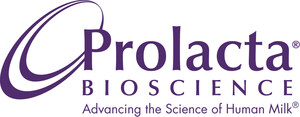
Totality of Evidence Demonstrates Meaningful Reductions in Both Medical and Surgical NEC for Very Low Birth Weight Infants
DUARTE, Calif., Nov. 12, 2025 /PRNewswire/ -- A landmark systematic review and meta-analysis published in the journal Nutrients has found that an Exclusive Human Milk Diet (EHMD) with Prolacta Bioscience's human milk-based fortifiers is associated with 35% reduced risk of medical necrotizing enterocolitis (NEC) and 49% reduced risk of surgical NEC in premature infants, compared to diets containing cow milk-based products. The comprehensive analysis represents the most extensive evaluation of the evidence to date, examining 20 studies encompassing 6,794 very low birth weight (VLBW) premature babies.
NEC is a devastating intestinal disease that is a leading cause of death and disability in premature infants. The new findings provide crucial clarity for clinicians and families navigating nutrition decisions for the most vulnerable babies.
"This is the largest and most comprehensive analysis to date examining the effects of an Exclusive Human Milk Diet on NEC outcomes," said co-author Jenelle Ferry, MD. "As both a neonatologist and researcher, these findings confirm the protective benefits I've consistently observed in my own clinical practice with premature infants."
The meta-analysis included five randomized controlled trials and 15 observational cohort studies conducted in the United States, United Kingdom, Canada, Austria, and Sweden. Researchers used rigorous statistical methods to account for differences in study design, fortification protocols, and baseline patient characteristics. The trials were analyzed both by study type and collectively, and the observed reduction was consistent across both the randomized control trials and the observational studies.
"While individual randomized trials have often failed to reach statistical significance, they were also underpowered to detect differences in rare outcomes like NEC," said co-author Sarah M. Reyes, Ph.D. "Our synthesis demonstrated a consistent direction and magnitude of benefit across all study types. This suggests that for very low birth weight infants, particularly those weighing 1,250 grams or less, an EHMD with human milk-based fortifiers is associated with meaningful reductions in both medical and surgical NEC."
NEC can vary in severity. Medical NEC requires intervention such as stopping feeds and administering antibiotics. Surgical NEC, the most severe and often life-threatening form, occurs when the intestine perforates or tissue dies, requiring surgery that often involves removing damaged sections of the intestine.
Key findings:
- In direct comparisons of fortifier type with a base diet of human milk, Prolacta's human milk-based fortifiers were associated with 35% lower odds of medical NEC and 49% lower odds of surgical NEC compared to cow milk-based fortifiers.1
- The protective association was consistent across both randomized controlled trials and real-world observational studies, with pooled analyses achieving statistical significance.1
- The majority of infants studied weighed ≤1,250 grams (2.75 lbs) at birth, representing the smallest and most vulnerable babies at highest risk for NEC.1
The inclusion of real-world observational data provides essential evidence of effectiveness across diverse clinical settings. The authors note that existing randomized trials enrolled relatively small numbers of infants (53-228 total) at a time when NEC incidence was already declining due to improved practices in neonatal intensive care units (NICUs). Detecting statistically significant differences in such rare outcomes would have required enrollment of approximately 5,000-9,000 infants — a number that renders traditional randomized trials impractical.
The authors call for standardization of fortification protocols and reporting metrics, pragmatic registry-based trials, and continued documentation of both feeding practices and outcomes to strengthen the evidence base for optimal nutrition strategies in VLBW infant care.
About Prolacta Bioscience
Prolacta Bioscience® is a global life sciences company dedicated to Advancing the Science of Human Milk® to improve health outcomes for critically ill and premature infants. More than 125,000 extremely premature infants worldwide2 have benefited from Prolacta's human milk-based products, which have been evaluated in more than 30 peer-reviewed clinical studies. In a significant advancement, Prolacta has developed Surgifort®, the first and only FDA-approved human milk-based fortifier designed for term infants recovering from corrective surgery for gastroschisis. Operating the world's first pharmaceutical-grade human milk processing facilities, Prolacta maintains the industry's strictest quality and safety standards, with over 20 validated tests for screening and testing human milk. Prolacta's manufacturing process uses vat pasteurization to ensure pathogen inactivation while protecting nutritional composition and bioactivity. Learn more online or at X, Instagram, Facebook, TikTok, and LinkedIn.
Media Contact:
Loren Kosmont
[email protected]
310-721-9444
References
- Reyes SM, Paul TL, Ferry J. Human milk fortification and necrotizing enterocolitis in very low birthweight infants: state of evidence and systematic review with meta-analysis. Nutrients. 2025;17:3384. https://doi.org/10.3390/nu17213384
- Data on file; estimated number of premature infants fed Prolacta's products from January 2007 to May 2025.
SOURCE Prolacta Bioscience







Share this article